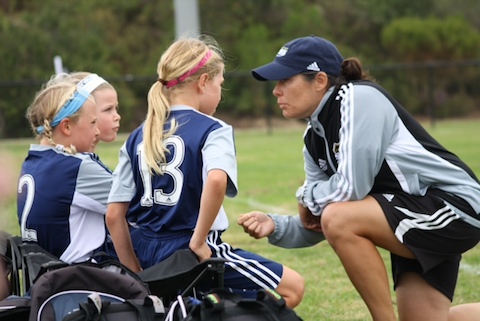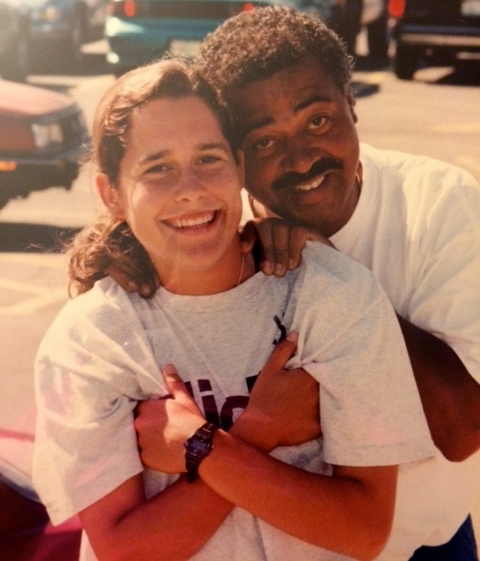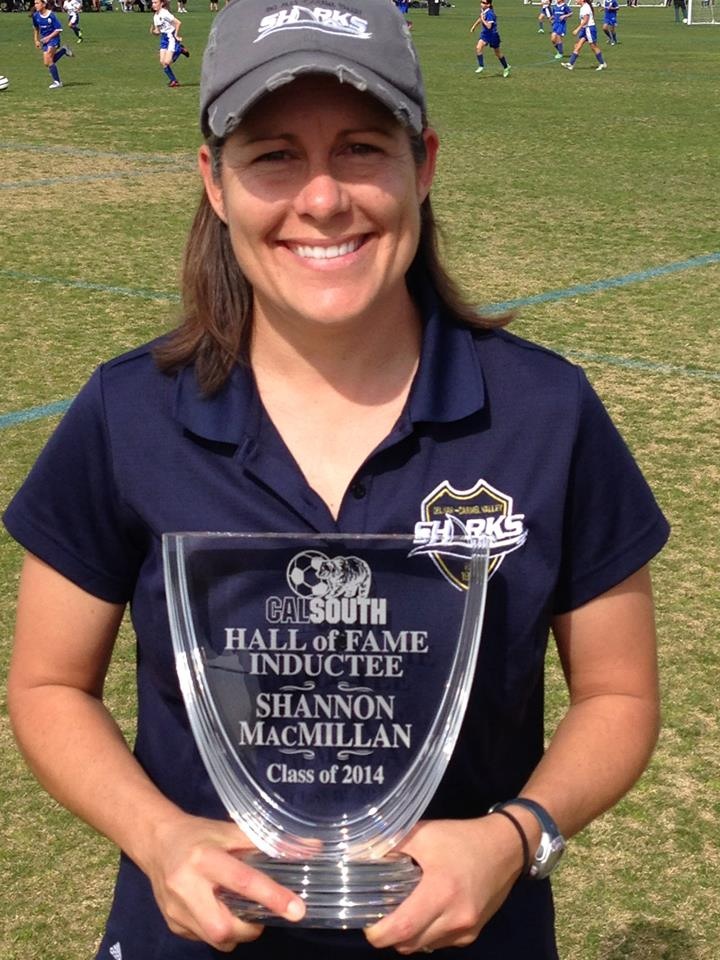Women In Soccer: DMCV Sharks’ Shannon MacMillan on the Role of Female Coaches in Youth Soccer
We wanted to kick off the Women In Soccer Series by celebrating the women who have already achieved so much in the world of soccer and are phenomenal role models. Here is an interview with Shannon MacMillion celebrating Women in Soccer.
When Shannon MacMillan was honored with the Herman Trophy in 1995, the University of Portland star became the first female player west of the Rockies to receive the coveted award as the best college player in America. She would go on to play 176 international matches over a twelve-year career with the U.S. Women’s National Team, scoring 60 goals as a midfielder and forward. In the 1996 Olympics MacMillan scored the winning goal in the semifinal against Norway, and then netted the first goal in the final against China that the U.S. won 2-1. She was also a member of the 1999 FIFA Women’s World Cup winners that defeated China in the now-legendary penalty kick final.

MacMillan continued her success on the international stage, serving up the corner kick that Joy Fawcett turned into a goal on a header against Germany in the 1999 World Cup quarterfinals and scoring against Nigeria in the 2000 Olympics. Her career was sidetracked temporarily by a torn ACL while playing for the San Diego Spirit in the Women’s United Soccer Association (WUSA), but she was back on the pitch in time for the 2003 FIFA Women’s World Cup. Her best year was 2002, when she scored 17 goals and was named U.S. Soccer Female Athlete of the Year.
After finally retiring from the pitch in 2006, MacMillan naturally moved into coaching, taking a position as an assistant coach at UCLA in 2007. But San Diego beckoned, and eventually she answered.
While she was born in Syosset, New York, MacMillan grew up in Escondido in northern San Diego County. She attended and starred at San Pasqual High School before heading north to study and play at the University of Portland. In 2008 she was inducted into the San Diego Breitbard Hall of Champions, so it was no surprise when she returned to the area as Director of Competitive Programs for Del Mar Carmel Valley Sharks in 2010, eventually becoming Director of Coaching and then Director of Operations in 2013.
A strong advocate for women’s soccer and female coaches, MacMillan shared her views on women coaches in youth soccer with SoccerToday editor Diane Scavuzzo.
Diane Scavuzzo: What inspires you to coach?
Shannon MacMillan: I consider myself a teacher, and I have such an amazing opportunity to make a difference in the life of a child. There is no greater gift than that!

The best coach I ever played for is my inspiration to coach. Clive Charles was my coach at the University of Portland, and he had such a profound impact on my life that my goal is to do the same with my players. Clive saw me as a person first and foremost and helped me grow into the person and coach I am today. He helped me embrace the fact that it was okay to be a strong and athletic female and helped me build my self-confidence both as a soccer player and as a person.
Diane Scavuzzo: What is it that you hope to teach your players?
Shannon MacMillan: Much as Clive did for me, I hope to help all of my players learn such invaluable life lessons such leadership, sportsmanship, communication, respect, overcoming adversity, teamwork, goal setting, confidence, etc. I want my players to have the tools needed to help them succeed in life.
Diane Scavuzzo: Why do you think there are so few women coaches?
Shannon MacMillan: I think more often than not the women are the caregivers within their families. When you have kids, especially as they get older and start to have their own activities, it is very hard to have much time for anything else.
Diane Scavuzzo: Why does it seem that female coaches have not been more welcomed in our youth soccer world or the professional soccer world?
Shannon MacMillan: I think there is a stigma out there in soccer that if you are male and you have an accent then you must know what you are talking about! Society views a male coaching females as acceptable but the reverse is not true, which limits a female’s options by half.
Diane Scavuzzo: Do you think there are any fundamental differences between women and male coaches?
Shannon MacMillan: From my experience, women coaches tend to be stronger when it comes to communicating with the players and the families. I think they are also more apt to look at building a more complete player versus just focusing on the soccer aspect of their players’ lives. I also think female coaches are less ego-driven.
Diane Scavuzzo: How important do you think it is to have the same sex coach if you are a girl or boy?
Shannon MacMillan: From the time I was playing professional – and still today – I think the most important aspect of a coach should be whether or not they are a good coach, not if they are male or female.
Diane Scavuzzo: How does a girls’ team benefit from having a female coach?
Shannon MacMillan: They will have a positive role model that can teach them from experience and empower them to have their own dreams.

Diane Scavuzzo: What is the difference between coaching girls and boys?
Shannon MacMillan: Girls are more emotional, and you have to place a bigger emphasis on team building and camaraderie.
It is very easy for boys to be in an argument five minutes before stepping on the field but not let it affect how they play. With girls, an argument can lead to more chaos within the team and the team not being able to perform.
Diane Scavuzzo: Did you have any female coaches when you were a youth player/college player?
Shannon MacMillan: I remember a few female coaches when I was very young. There weren’t too many women who were afforded the opportunities I was to play in college and/or professional leagues, so they didn’t make their way into the coaching world. We should start to see more female coaches as more players retire from the professional game.
Originally Published Earlier






